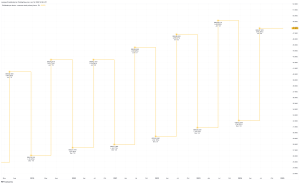President Joe Biden will give Fed Chairman Jerome Powell a second four-year term. say analysts who keep tabs on Washington for Wall Street and are now fairly certain about his renomination.
“My base case is Powell now. That’s the consensus,” said Stephen Myrow, managing partner of Beacon Policy Advisors, in an interview.
Joe Lieber, managing director for the U.S. for Eurasia Group, agreed: “I think it is a high probability they renominate Powell.”
Earlier in the summer, Myrow and other Washington tea-leaf readers thought that Biden might decide to select a “groundbreaking” appointment such as the first Black Fed chair.
But no new groundbreaking pick emerged over the summer. Introducing someone now doesn’t make much sense, Myrow said. Biden now “has too much on his plate,” he added.
Leiber said the choice of Powell would be good politics for Biden.
Biden “will look super-bipartisan,” by giving Powell a second term. Powell is a Republican who was picked by President Donald Trump in 2017 to lead the Fed. The selection should help shore up Biden’s support among independent voters who have soured on Biden in the wake of the chaotic exit from Afghanistan last month.
“It is a slam-dunk in terms of market reaction and a slam-dunk in terms of the Senate — Powell will get 80 votes,” Leiber said.
As for policy, Powell has guided the central bank to adopt a new dovish strategy. Under his tenure, a healthy labor market now takes priority over inflation fears and the central bank is going to allow higher inflation to make up for past shortfalls.
“Biden’s got a very dovish and well-regarded Fed chairman, why rock the boat,” said Greg Valliere, chief U.S. policy strategist at AGF Investments.
Over the past few months, the Biden team has been quiet about the selection of Fed chairman. Perhaps the only insight into the White House process was a Bloomberg story which quoted people close to Treasury Secretary Janet Yellen saying that she told senior White House advisers that she supports reappointing Powell.
Powell’s term expires at the end of January, one year after the presidential election and inauguration. The timing is no accident. Fed officials designed the process in order to keep the selection of the Fed chairman away from presidential elections.
Some progressive Democrats think the Powell Fed should have done more on climate change and been tougher on big banks.
To push back on the regulatory question, the former Democratic architects of the government’s response to the 2008 financial crisis — U.S. Senator Christopher Dodd and former Congressman Barney Frank — called on Biden to reappoint Powell.
One open question is when when Biden might make the announcement of his choice.
Conventional wisdom is that the president will wait until after Congress completes work on a long to-do list of fiscal policy, including the federal spending deadline, the debt ceiling and the $3.5 trillion social spending package.
Read:‘Uniquely frenetic period’ ahead for Congress
If the Fed announcement drags on into late October, that might be a signal that the White House is considering somebody other than Powell, Leiber said.
Brian Gardner, chief Washington policy strategist for Stifel Financial Corp., said in a recent note that the most likely outcome is Biden renominates Powell for another term and moves Fed Governor Lael Brainard into the role as point person on banking regulation.
There could be as many as three other vacancies on the seven member board to fill if Powell and Brainard remain on the board. Biden is expected to select progressive economists to assuage the left wing of his party.
“So even with Powell renominated, the Fed board will almost surely be more progressive and more diverse by next spring,” said Ian Katz, a financial analyst with research firm Capital Alpha Partners.
This post was originally published on Market Watch






